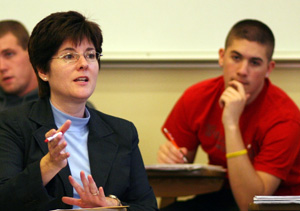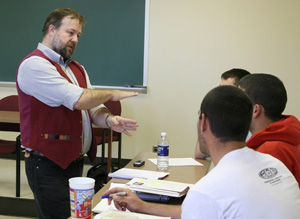Wabash College students have again set the bar for "level of engagement" compared with their peers across the country.
 The 2007 National Survey of Student Engagement (NSSE) is based on information from about 380,000 randomly selected first-year and senior students at more than 722 four-year colleges and universities. The study gives schools an idea of how well students are learning and what they put into and get out of their undergraduate experience.
The 2007 National Survey of Student Engagement (NSSE) is based on information from about 380,000 randomly selected first-year and senior students at more than 722 four-year colleges and universities. The study gives schools an idea of how well students are learning and what they put into and get out of their undergraduate experience.
"This really demonstrates results as opposed to some of the other rankings which are often based on characteristics and statistics which haven't been proven to relate to learning," Dean of Admissions Steve Klein said. "The NSSE characteristics have been proven to relate to learning. It helps us promote not just Wabash learning but the Wabash advantage."
Wabash has scored in the top percentiles of the NSSE study each year.
The survey questions students in five distinct categories: level of academic challenge, active and collaborative learning, student-faculty interaction, enriching education experience, and supportive campus environment. Each category is explained below along with the Wabash scores as they compare to peer colleges and the national averages.
NSSE provided a breakout of a few of the individual questions to show areas of strengths and weaknesses. The comparison numbers are startling. The Great Lakes schools are similar midwest private colleges. The NSSE column is the national averages.
Freshmen Questions: Wabash G. Lakes NSSE
| Read 10 or more books or similar assignments | 72% | 44% | 35% |
| Wrote more than 4 papers, between 5-19 pages | 81% | 42% | 33% |
| Participated in Community Service or Volunteered | 70% | 42% | 38% |
| Completed foreign language coursework | 52% | 27% | 22% |
Senior Questions: Wabash G. Lakes NSSE
| Read 10 or more books or similar assignment | 79% | 41% | 34% |
| Wrote more than 4 papers, between 5-19 pages | 91% | 54% | 50% |
| Completed a culminating senior experience | 91% | 43% | 32% |
| Completed foreign language coursework | 89% | 41% | 41% |
In this year’s survey, the NSSE staff provided additional break out information on student response.
For example:
- 96% of freshmen feel the institution places substantial emphasis on academics.
- 80% of freshmen report their exams strongly challenge them to do their best work.
- 70% of freshmen say they discuss readings or ideas from coursework outside of class.
- By their senior year, 69% of students have participated in some form of practicum, internship, field experience, co-op, or clinical assignment.
- 69% of freshmen say the faculty are available, helpful, and sympathetic.
- 66% of freshmen at least occasionally spend time with faculty members on activities other than coursework.
- 95% of freshmen report a favorable image of Wabash College
- 82% of seniors would choose Wabash again if they could start their College career over again.
- 93% of freshmen feel Wabash has a substantial commitment to their academic success.The raw scores can become a bit academic, but note Wabash’s scores were higher in every single category than the 722 college average. The scores were also higher than from a select group of peer (or similar) colleges.
 In the five areas of effective educational practices, Wabash freshmen and seniors scored consistently above the 90th percentile.
In the five areas of effective educational practices, Wabash freshmen and seniors scored consistently above the 90th percentile.
Level of Academic Challenge: Preparing for class (studying, reading, writing, rehearsing, etc., related to an academic program.)
Active and Collaborative Learning: Asked questions in class, made class presentations, worked with other students, tutored, participated in a community-based project.
Student-Faculty Interaction: Discussed grade or assignments with instructor, discussed career plans with faculty or advisor, discussed ideas from readings or classes with faculty outside of class, received prompt feedback from faculty on academic performance, worked with faculty on a research project outside of course or program requirements.
Enriching Educational Experience: Co-curricular activities, internship or field experience, community service or volunteer work, foreign language or study abroad, independent study, serious conversations with students of different religious beliefs, political opinions or personal values, use technology to discuss or complete an assignment.
Supportive Campus Environment: Environment provides support student needs to succeed, environment provides support to thrive socially, cope with non-academic responsibilities, quality of relationship with students, faculty and administrative personnel and offices.